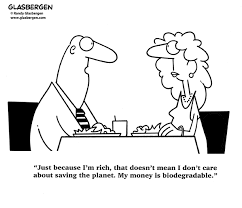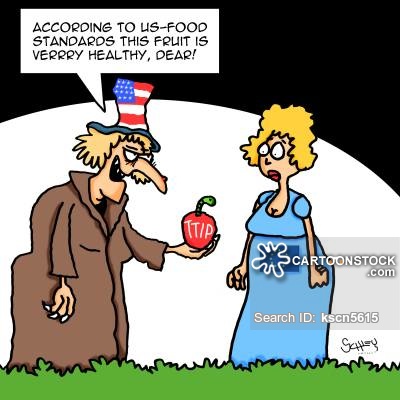
What happens when the Precautionary Principle collides with ‘the Market’? Here’s a clue: the wheels don’t come off the Market bus.
The Precautionary Principle is a brilliant idea. If you’re old enough you may remember the early days of computers when, after hours of word-processing input, the very large and very slow p.c. would freeze. After trying every key you could think of to no effect, in the end you pressed delete and lost it all – no warning, no back-up, no ‘Are you sure?’ No Siri to help, just a day’s work lost.
The Precautionary Principle is supposed to stop us pressing delete when to do so might threaten a lot more than a day’s work. ‘Might’ is the big word here. We don’t have to be sure it’s the wrong thing to do, we just have to have sufficient doubt. And then there’s this thing called ‘corporate might’.
Here’s a definition of the Principle:
When human activities may lead to morally unacceptable harm that is scientifically plausible but uncertain, actions shall be taken to avoid or diminish that harm. Morally unacceptable harm refers to harm to humans or the environment that is:
Source: UNESCO COMEST report The Precautionary Principle
* threatening to human life or health, or
* serious and effectively irreversible, or
* inequitable to present or future generations, or
* imposed without adequate consideration of the human rights of those affected.
In theory the principle operates in almost all spheres. In medicine for example there is an ancient principle of ‘First do no harm’ which seems to be a pretty good starting point. In an environmental context, where it might be thought the precautionary principle offered vital protection, it is backed up by the ‘understanding’ that ‘the polluter pays’. So it’s a great theoretical underpinning to human activity in areas as diverse as farming, medicine, commerce, science and ……. Armegeddon.
How does it work in practice? Well, it’s hard to come up with a useful measure of the principle’s application but, if I say,
“it’s as effective as the UK’s Brexit negotiating team was!”
you’ll get a general idea of how good a shield it provides against leaping without looking.
A couple of examples (from many):
- 1) over 30 years after Bhopal adequate compensation was still being pursued by victims and their relatives. Union Carbide claimed 3,800 people died. Survivors and ICJB (International Campaign for Justice in Bhopal) conservatively claim at least 8,000 died in the first week.

- 2) the catastrophic Exxon Valdez oil spill and reparation claims saw a similar willingness by the polluter to spend a fortune on legal costs rather than on reparations.
“I could ……….. point out how long and hard ExxonMobil has fought (successfully) to reduce fines and avoid payment while enjoying record profits. It’s the cost of doing business, written off, while they drag things along for decades with appeals and backroom deals.“
March 18, 2015, Updated: June 29, 2016
What could possibly explain the gulf between principle and practice? Well, it’s a bit of a tenuous link but I think it might have something to do with money. What gets in the way might just be the targets identified within CEOs’ and senior managers’ pay and remuneration packages, which, I’m guessing, highlight short and medium-term performance related to growth and profits. Who gets a bonus for prioritising possible consequences above profits? Nobody gets rich saving the planet do they? which is a pity because, if they did we’d not have a great deal to worry about.
Off the top of my head I came up with some of the areas where the principle should be making a difference – they’re scaled up from ‘look both ways before you cross the road’ which is one of the few areas where we generally get it right:
|
Anyone can build a much bigger list in five minutes and fill a side of A4 in, say, half an hour.
We might expect that science and research would inform practice when the stakes are high and that our governments would legislate when there is, not just a possibility of damage, but hard evidence of damage. Why doesn’t it work like that?
Well in the UK we have a government that believes that it is much better to encourage business to voluntarily address areas identified as of concern; they are committed to ‘working in partnership’, not to requiring or legislating to ensure compliance. This is an article of faith for the Conservative party which, entirely co-incidentally, is largely funded by business and intensively lobbied whenever legislation is mooted. This week it transpired that
‘One in 10 Tory peers have given more than £100,000 to party’ – 27 members of House of Lords have donated almost £50m in total to Conservatives’
Guardian 29.12.22
There was a slightly different approach from new-old labour under Jeremy Corbyn and is now from new-new labour under Kier. The ‘spawn of Satan’ EU also lacked faith in the benign intentions of the private sector. Hence the EU is condemned by the Daily Wail and the rest for its suffocating bureaucracy and new-old and new-new for being in the pay of the commies or in hock to union barons (as opposed I guess to Tory barons as above. I expect that’s different though…)
In the US, when it was Trumpworld and all great again, all bets were off. Trump appointees to federal agencies seem to be carefully chosen to disable any protection for the public or the environment – ‘Let it rip’ was the administration (surely not the right world for Trump’s White House) approach to everything from mining, big oil, nuclear war and too many Big Macs. If you haven’t seen it, have a look at the clip of Trump’s Environmental nominee Kathleen Hartnett White explaining her credentials to the Senate Environment and Public Works Committee.
Under Biden and the woke democrats all sorts of terrible rowing back which can only damage the ‘good old USofA’ has been allowed. Biden ‘even’ appointed Deb Haaland to lead the Department of the Interior, making her the first ever Native American Cabinet Secretary, and Mohegan Indian Tribe Lifetime Chief Marilynn Malerba as U.S. Treasurer, the first time a Native woman’s signature will appear on U.S. currency. Imagine appointing people who have real experience of the issues to government posts. And it is quite hard to argue that Native Americans aren’t really American though I expect there’ll be no shortage of people trying..
But, to return to Westminster, how do voluntary codes work in the UK? Here’s an example.
Alcohol
The government line on alcohol consumption is that minimum pricing would penalise the vast majority who, like themselves are sensible social drinkers. Oddly, Scotland, where they know a thing or two about alcohol consumption, has taken a different line and gone for minimum pricing. In England we have ‘Drinkaware’ (a charity largely funded by UK alcohol producers, retailers and supermarkets) as our secret weapon against alcohol abuse, coupled with savage cuts in education and support programmes available to ‘problem drinkers’. Essentially we provide milder warnings about the danger of alcohol than we get when we buy a new electric toaster.
Toasters, by the way, are estimated to cause around 700 deaths world-wide a year. There is some evidence that this statesmanlike approach, which essentially assumes that business is benign and always has the public good at heart, is not hugely effective. For example:
Alcohol is estimated to cost the NHS around £3.5bn per year, which amounts to £120 for every taxpayer, ( HSCIC). Overall, treating alcohol-related conditions costs the NHS about 3.6% of its annual budget. The total cost of alcohol harm to society is estimated to be much higher, if the direct healthcare costs are combined with those of crime and lost productivity in the workplace.
£3.5bn is a tad more than is contributed to the Conservative Party by brewing and distilling companies. It’s not that easy to get a full picture of how much is given to political parties and by whom; a list of individual donors is quite revealing but hardly a complete picture. What is a fair bet though is that donors are buying a bit more than the chance of a knighthood. Essentially, not doing more to control the sale and consumption of alcohol is costing £3.5bn but benefiting the current party in government, which, of course, consists entirely of social drinkers.
There were 3,744 drug related deaths in England and Wales in 2016 according to the ONS. There were 7,327 alcohol-specific deaths in the UK in the same year. So maybe it’s time the voluntary approach was applied to the illegal drugs ‘industry’ as long as it results in an increased contribution to you know who?
What is it about industry and commerce that drives it to buy off politicians rather than ensuring that they ‘first do no harm’?
Well the defined duties of company directors in the UK seem to require more obligations than just ‘chase the money’. The relevant duty is to Promote the success of the company.
This requires directors to have regard to (my bold):
- the likely consequences of any decision in the long term
- the interests of the company’s employees
- the need to foster the company’s business relationships with suppliers, customers and others
- the impact of the company’s operations on the community and the environment
- the desirability of the company maintaining a reputation for high standards of business conduct
- the need to act fairly as between members of the company.
It’s worth repeating this I think:
Who gets a bonus for prioritising possible consequences above profits? Nobody gets rich saving the planet do they? which is a pity because, if they did we’d not have a great deal to worry about.
Let’s look at two more items in the list: it could be any there but I’ve gone for antibiotics and sugar, just to underline how generalised the problem is.
- Antibiotics: Most of us are now aware of the dangers associated with the widespread, inappropriate over-prescription of antibiotics. Infections are becoming antibiotic resistant and diseases we thought we had under control are becoming difficult to treat. In the UK health professionals have recognised, and are tackling, the problem. Some of the resistance though is developed when farmed animals are treated with antibiotics. Antibiotics are routinely given to whole flocks and herds to prevent the onset of disease rather than to treat disease. Up to ¾ of the total consumption of antibiotics is by animals rather than humans. Here’s a cheerful quote for you:
“Chickens for sale in Britain’s supermarkets are showing record levels of superbugs resistant to some of the strongest antibiotics, research from the government has found.”
Guardian 16.1.18, pp6
Why have antibiotics been overused and abused? It’s not really because GPs are a soft touch and patients want something to make them better now. It’s because it’s really hard to sell an obviously sick chicken and it’s expensive to keep them in conditions that mean they don’t get sick. We want cheap food and there’s a photoshopped friendly, ruddy-cheeked farmer somewhere in the world who is happy to provide it.
When antibiotics stop working so will a lot of us.
The WHO tells us antibiotic resistance can spread rapidly among herds and flocks and can also be spread by the consumption of affected food products. In the US, where farming is even more industrialised than in the UK, antibiotics seem to be used more frequently and in far larger doses. According to the Guardian (8.2.18) beef cattle get between nine and sixteen times the dose of antibiotics given in the UK; US beef imports are banned in Europe at the moment because of the free use of growth hormones on US ‘farms’. Trump’s Undersecretary for Trade and Foreign Agricultural Affairs was ”sick and tired” of hearing UK concerns about chlorinated chicken and US food standards. Roll on a post-Brexit trade deal with the US which should help bacteria to take back control. And, if you’re visiting the US at all, it might be worth taking sarnies and bottled water just to be on the safe side.
2) Sugar: When I was in my twenties a fairly regular contributor to Radio 4 in the mornings was John Yudkin. He warned of the danger to health of refined white sugar. He was treated with some condescension and regarded as eccentric. Generally, ‘to ensure balance’ he was opposed by someone from the sugar industry. So, on one side:
a disinterested scientist raising what turned out to be wholly justified concerns (diabetes treatment now costs the health service an estimated £14 billion a year, with the cost of treating complications representing the much higher cost. The prevalence of diabetes is estimated to rise to 4 million by 2025.) Diabetes.co.uk
and on the other:
the corporate sugar lobby.
He had this thing about sugar. He kept on saying it was bad for us. This was not popular with the food industry. It preferred fat to be the culprit and developed lots of low-fat products which we are still consuming; low in fat but high in sugar.
“Instead of laying the blame at the door of fat, John Yudkin claimed there was a much clearer correlation between the rise in heart disease and a rise in the consumption of sugar. Rodents, chickens, rabbits, pigs and students fed sugar and carbohydrates, he said, invariably showed raised blood levels of triglycerides (a technical term for fat), which was then, as now, considered a risk factor for heart disease. Sugar also raised insulin levels, linking it directly to type 2 diabetes. The British Sugar Bureau put out a press release dismissing Yudkin’s claims as “emotional assertions” and the World Sugar Research Organisation described his book as “science fiction”.
Julia Llewellyn Smith, Daily Telegraph, 17 Feb 2014
Yudkin was “uninvited” to international conferences. Others he organised were cancelled at the last minute, after pressure from sponsors, including, on one occasion, Coca-Cola. When he did contribute, papers he gave attacking sugar were omitted from publications. The British Nutrition Foundation, one of whose sponsors was Tate & Lyle, never invited anyone from Yudkin’s internationally acclaimed department to sit on its committees.
Ibid
Today, ‘Action on Sugar’ stresses the importance of protecting children from this “public health hazard” and calls for the food industry to “immediately reduce the amount of sugar that they are adding, particularly to children’s foods, and stop targeting children with massive advertising for high-calorie snacks and soft drinks”. ‘Action on Sugar’ is supported by 18 expert advisers. Its chairman is Professor Graham MacGregor, professor of cardiovascular medicine at the Wolfson Institute, Queen Mary University of London.
You can find a more detailed account here (Julia Llewellyn Smith, Daily Telegraph, 17 Feb 2014) .
So here we are:
- we’ve got plastic in our seafood, not least because makeup just didn’t do it without microbeads;
- we’ve got neonicotinoids in our honey because the likes of Monsanto say they really don’t hurt us (if you want to get a real feel for agrochemical industry’s approach to the precautionary principle have a look at the Monsanto site: “ Seed treatments like neonicotinoids can actually help bees.”;
- we’ve got tower blocks clad in combustible materials;
and - we’re into the sixth mass extinction event.
Fortunately, we’re the most intelligent species on the planet and our government is on the case. Why doesn’t that reassure me? Here’s one reason – it’s called Brexit; this is what the Telegraph suggested was needed post-Brexit:
“Cut the EU red tape choking Britain after Brexit to set the country free from the shackles of Brussels
Today, the Telegraph calls on the Conservative Party to promise a bonfire of EU red tape in its 2020 manifesto to put Britain on a radically different course.”
The Cameron/Osborne (oh yes and that nice Nick Clegg) led UK coalition government of 2010 followed the usual Conservative route of having a ‘bonfire of red tape’ and espousing austerity. As a result, today we live with the tragic legacy of Grenfell1 and public services such as health close to total collapse: and still UK government free marketeers plead for deregulation, a dash for growth and tax cuts made on the back of reduced public spending.
Bhopal, Exxon Valdez and a whole terrible load of other un-natural disasters tell us that businesses competing in world markets cut corners and take risks to turn a profit, because if they don’t someone else will; we really don’t need less red-tape do we? we need more..
- On 14 June 2017, a high-rise fire broke out in the 24-storey Grenfell Tower block of flats in North Kensington, West London, at 00:54 BST and burned for 60 hours. 72 people died, two later in hospital, with more than 70 injured and 223 escaping. It was the deadliest structural fire in the United Kingdom since the 1988 Piper Alpha oil-platform disaster and the worst UK residential fire since World War II…..The fire was started by an electrical fault in a refrigerator on the fourth floor. This spread rapidly up the building’s exterior, bringing flame and smoke to all residential floors, accelerated by dangerously combustible aluminium composite cladding and external insulation, with an air gap between them enabling the stack effect.
https://en.wikipedia.org/wiki/Grenfell_Tower_fire









One thought on “The Precautionary Principle – great theory, lousy practice.18 min read”
Comments are closed.